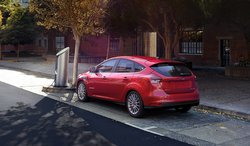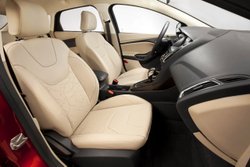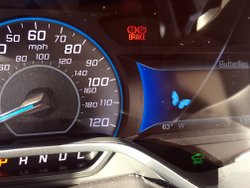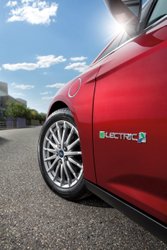Good Drive, but Short Range and Limited Storage

The compact Ford Focus is a favorite around the world, and enjoyable to drive, with taut steering, responsive engine performance, and a suspension that lets you feel the road. When you replace the car’s engine with an electric motor, the Focus (now the 2016 Ford Focus Electric) retains much of that driving pleasure, but introduces three major issues—cargo space, battery range, and price.
Because the Focus wasn’t designed to be an electric car, the battery ended up in the cargo area, so there’s a big lump behind the rear seats. Those seats fold forward (although not completely flat), so you can stash something long and wide but not thick—like a painting, perhaps, or a garment bag. Forget using it to haul an upright bass, however.
Range is a limitation. The 2016 Ford Focus Electric I tested for a week had an official EPA range of just 76 miles, which makes it competitive with first generation electric vehicles, such as the original Nissan Leaf and the current Volkswagen e-Golf. However, it can’t compare with the upcoming Chevrolet Bolt’s 238 miles, the new Leaf’s 107 miles or the 2017 e-Golf’s 124 miles.
Colorfully Quiet

My test car came in an attractive Kona Blue, a new color for 2016. The black and tan interior, with silvery accents, is no longer fresh, but still evokes some kinetic energy. With electric power and solid construction, the Focus Electric is blissfully silent inside when the radio is off. On the center screen, Ford Sync 3 is simplified and much easier to use than the previous version.
In the basic car, the seats are covered in Repreve fabric, made from 100 percent recycled materials. My tester, with Light Stone leather seats, looked a little more elegant. My wife, who is not easily impressed, complimented these chairs.
The Focus Electric uses a 107kW electric motor tucked under the hood where a four-cylinder gas engine would normally live. Working with a 23-kwH liquid heated and cooled lithium-ion battery, it spins out 143 horsepower and 184 lb.-ft. of torque, good for quick acceleration and magically silent cruising. With its big battery, the EV weighs in at a portly 3,622 pounds, but you don’t notice that weight when driving around.
EPA numbers are 110 City, 99 Highway, and 105 MPGe combined. Use these figures to compare EVs—and note that they are more efficient than gasoline cars. The Focus Electric earns smog and greenhouse gas numbers of twin 10’s, but, of course, the cleaner the plant that generated the electricity, the cleaner your car is in the overall scheme.
Butterflies for the Best Drivers

Like all electrics, the Focus provides displays to encourage you to drive gently and conserve your battery charge. The Focus offers blue butterflies in the right side of the instrument panel (if you choose that—there are numerous other things to view there if you want).
Here’s how you get them. On the left side, the display shows estimated range for the current state of battery charge, against an image of the AA style battery like the one in your TV remote. You are assigned a “Budget” when you start out, and your driving behavior affects the “Status.” If you’re in the negative, no butterflies. Get positive, through gentle acceleration, effective braking, and rolling downhill, and you may net a positive.
I noticed butterflies when I ventured downtown from my house. The trip is mostly downhill, and lo and behold, I had a +2—and two butterflies fluttered in. I got to +3—and got a third one! But on the way up the hill to my house, I lost them. The next day, I earned 11 butterflies on the way to work.
Freeway driving, especially at California freeway speeds, can suck up battery charge fast. Typical commute traffic, on the other hand, is great for an EV, since for every few yards forward you go, there’s another chance to hit the brakes and generate electric power.
The Focus’ display includes a “Brake Coach”–a couple of spinning circles that show how much of the energy you recently consumed was recovered by regenerative braking. I often got 100 percent or near that, so I must be doing something right.
You can recharge the battery from empty in 3.6 hours, per Ford. That’s easy at a Level 2 (240-volt) charger at work. If you try using standard household current, plan on 20 hours to replenish. If you’re just topping off, overnight should do it.
The MyFordMobile app lets you keep tabs on your vehicle charge or precondition the car remotely. I downloaded the app, but because I don’t own or lease my test car, I couldn’t make the connection to watch it work in real time.
A Good EV, But Maybe Part of the Old Guard

My tester had a base price of $29,170, plus a few options. With leather seats ($995), the “Exterior Protection Package” ($245), a snappy charge door graphic ($60), and $875 destination, it came to
$31,345. Just for comparison, you can buy a perfectly nice gas-powered Focus SE starting at about $20,000.
Of course, depending on where you live, there are some tax breaks and rebates. In California, you should benefit from the $7,500 federal tax credit and $2,500 state rebate. Suddenly, it’s not that much more than the SE.
I’m torn on the 2016 Ford Focus Electric. On one hand, it’s very pleasant to drive and takes care of most of my needs just fine. But there are the significant drawbacks of limited range and compromised carrying capacity.
There are other positives for driving any EV. Electricity is cheaper than gasoline, especially if you charge at home in off-peak hours. Maintenance is minimal. For me in the San Francisco Bay Area, I can drive an all-electric car, with appropriate stickers, in the carpool lane and get my bridge tolls for half price.
If you have the right lifestyle (and access to another car for longer trips), the 2016 Ford Focus Electric, built in Wayne, Michigan, in a plant that uses solar power, may work for you. But the near future has models with longer ranges—including the upcoming 2017 Focus.
Related Stories You Might Enjoy:
Road Test: 2014 Volkswagen e-Golf
Road Test: 2016 Nissan Leaf
Road Test: 2016 Nissan Leaf SL
Road Test: 2016 Fiat 500e
Buyer’s Guide: Tesla Model 3, Chevrolet Bolt or 2016 EV
News: 2017 Chevrolet Bolt EV Specs
Disclosure:
Clean Fleet Report is loaned free test vehicles from automakers to evaluate, typically for a week at a time. Our road tests are based on this one-week drive of a new vehicle. Because of this we don’t address issues such as long-term reliability or total cost of ownership. In addition we are often invited to manufacturer events highlighting new vehicles or technology. As part of these events we may be offered free transportation, lodging or meals. We do our best to present our unvarnished evaluations of vehicles and news irrespective of these inducements.
Our focus is on vehicles that offer the best fuel economy in their class. We also feature those that are among the top mpg vehicles in their class. In addition, we aim to offer reviews and news on advanced technology and the alternative fuel vehicle market. We welcome any feedback from vehicle owners and are dedicated to providing a forum for alternative viewpoints. Please let us know your views at publisher@cleanfleetreport.com.

34 thoughts on “Road Test: 2016 Ford Focus Electric”